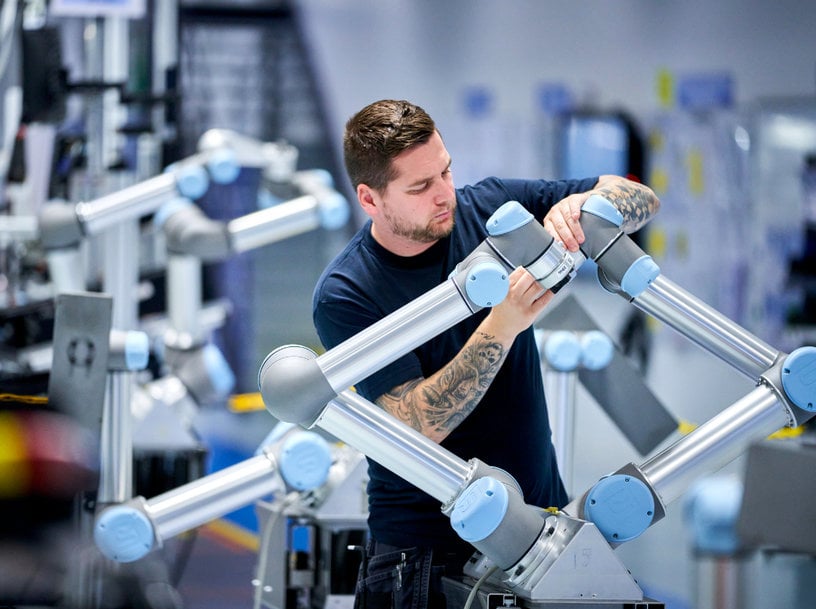www.ptreview.co.uk
12
'23
Written on Modified on
Big Companies, Small Robots: Why Collaborative Robots Are Attracting Big Players in Manufacturing
By Stacey Moser, Chief Commercial Officer, Universal Robots.

When it comes to automating factory processes, big companies have traditionally relied on costly and complex industrial robots and skilled in-house engineers. In comparison, what makes smaller collaborative robots (cobots) so attractive, and why are more and more large businesses turning to this technology to enhance their current production system and speed up factory automation.?
Cobots are being used alongside traditional industrial robots to enhance operations in large factories
Understandably, industrial robots have become an essential part of the operations of many factories. Despite that, these factories are looking for increased automation and flexibility, and cobots offer a solution. One of the main advantages of cobots is their easy integration into existing production lines without the need for major modifications of the workflow. Additionally, their compact size allows for their introduction without taking up valuable space on the factory floor.
Furthermore, Universal Robots' cobots come with industrial standard interfaces like ProfiNet and ProfiSafe, making integration into larger production lines faster and more efficient. But, the most thrilling aspect is when cobots are employed alongside traditional industrial cobots.
Stellantis, a prominent global automaker and provider of inventive mobility solutions, exemplifies this by integrating cobots into various areas of its production process. In Italy, the company already possessed a state-of-the-art powertrain plant equipped with traditional industrial robots. Within this extensively automated setting, the factory now utilises cobots at a specific station for oil pan dispensing to optimise production. This solution has yielded improvements in both quality and safety, while completely eliminating any downtime caused by this particular station.
Labour and skill shortages are prompting reassessments to job design
In today's current climate, companies are facing challenges in attracting and retaining workers, particularly large companies which have the furthest to go in terms of employee retention.
To address this issue, cobots offer a solution by enabling companies to increase production capacity and output without the need to hire additional employees. This is an appealing advantage in a competitive labour market. Moreover, cobots can have a transformative effect on workplaces by relieving workers from repetitive and physically demanding tasks, creating safer working conditions, and allowing employees to focus on more meaningful responsibilities.
This not only provides opportunities for up-skilling but also improves morale. It is not uncommon for employees to even give their cobots names, and operators often discover new applications for collaborative automation in the factory. Larger customers are already reaping these benefits, which gives them an advantage in attracting and retaining the necessary workforce in a challenging recruitment landscape.
A trend towards simplification, modularity and increased flexibility on the production line
Cobots have a few key features that set them apart from traditional industrial robots. One important aspect is their user-friendly interface, which means that specialised knowledge is not typically necessary for reprogramming. Additionally, cobots are portable and offer a level of flexibility that is highly valued by businesses. While many companies initially purchase cobots for specific tasks, an increasing number are recognising the benefits of being able to easily modify their position and role in production.
Cobots can be hung from ceilings, mounted on rolling carts, or placed on mobile robots. They can store multiple programs and handle adjustments in-house. This flexibility is particularly appealing to larger companies that are responding to the demand for personalisation and dealing with more uncertain market conditions. As a result, global organisations are re-evaluating their automation, productivity, and supply chain strategies, leading to new approaches in factory layout.
Technical advances have created new possibilities for cobot technology
Over the years, cobots have undergone significant advancements as technology has rapidly evolved. In recent times, the integration of machine learning and artificial intelligence has revolutionised industrial automation, with cobot automation taking the lead.
With their ability to adapt and learn, cobots equipped with machine learning can help large companies by identifying patterns and minimising process inefficiencies. This powerful combination of cobots and AI/machine learning will further unlock complex applications that were previously deemed unattainable.
The benefits for smaller companies, something to think about
In recent times, even large businesses have started adopting cobots for the same reasons as smaller businesses. The use of cobots can significantly enhance productivity, output, and quality for big companies. Cobots allow for reduced downtime and the potential for 24/7 production, leading to improved consistency and stable output quality. These benefits result in a quick return on investment.
A prime example of this is Melecs EWS in Austria, who leveraged a UR5 cobot with a custom gripper to greatly enhance their packaging process for printed circuit boards. This led to a 25% increase in productivity, allowing the company to package two million circuit boards annually. This success highlights the valuable role cobots can play in boosting manufacturing productivity.
Conclusion
UR is actively working with manufacturers to implement cobot technology, simplifying and digitising automation in their production environments. Through collaboration with trusted partners, UR effectively manage fleets of cobots on factory floors, addressing productivity challenges and labour shortages. It is evident that cobot technology holds immense potential for large manufacturing companies, and the future is indeed exciting for automation and solutions it can provide. Watch this space for a cobot near you.
www.universal-robots.com

